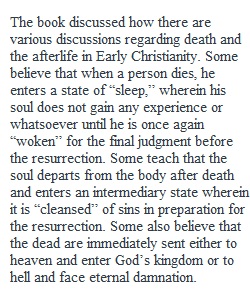


Q Discuss the following; post your initial response by Thursday night at 11:59 pm and then respond to at least two of your group members before Sunday at 11:59 pm. Analyze the basic ideas of death and the afterlife as they develop in the New Testament and Early Christianity. Note the similarities and differences concerning the afterlife in Early Christianity and Rabbinic Judaism. In your experience (if you have any), in what ways do Christians interpret this afterlife today? Is it more Platonist (the soul flies off to heaven) or more orthodox (the body will be resurrected)?
View Related Questions